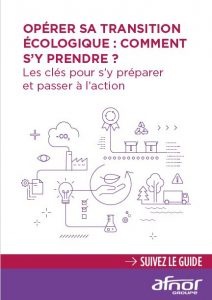
The voluntary ISO 14001 standard defines the requirements for an effective environmental management system (EMS). It is aimed at all organizations, whatever their size or field of activity. All sectors are concerned: industry (food processing, metallurgy, textiles, mechanics, chemicals, etc.) as well as the medical, social and administrative sectors…
ISO 14001 is based on the Deming wheel and its 4 key stages (plan, do, check, react), with the aim of continuously improving a company’s environmental performance…
ISO 14001 lists 18 requirements in 6 chapters:
- General requirements
- Environmental policy
- Planning
- Implementing actions to comply with environmental policy
- Controls and corrective actions
- Management review
Revised in 2015, ISO 14001 now incorporates the HLS (High Level structure), which presents a common framework for all management system standards, facilitating the implementation of integrated management systems (with ISO 9001, for example).
It also strengthens the role of management and takes better account of the global issues (economic, social, etc.) in which the organization operates. Finally, it integrates the “life-cycle perspective” of an organization’s activities, products or services, thus giving rise to a cross-disciplinary, multi-disciplinary approach leading to eco-design.
ISO 14001 certification: a commitment to environmental progress
The environmental manager, and/or the quality manager, plans, builds and manages the ISO 14001 environmental management system. He also supports the ISO 14001 certification process. Depending on the organization (single-site, multi-site), it may have to organize environmental audits. They will be carried out by internal and external auditors to verify compliance with ISO 14001 requirements.
also supports the ISO 14001 certification process. Depending on the organization (single-site, multi-site), it may have to organize environmental audits. They will be carried out by internal and external auditors to verify compliance with ISO 14001 requirements.
Valid for three years, ISO 14001 certification is a voluntary process that demonstrates a company’s environmental responsibility to its customers and partners, while reinforcing the involvement of management and employees. ISO 14001 certification also provides a significant competitive and financial advantage, as demonstrated by AFNOR Certification’s study on feedback from ISO 14001-certified facilities (PDF, 2018). In 2019, more than 312,000 ISO 14001 certificates were active worldwide, covering nearly 500,000 sites, according to ISO Survey.
